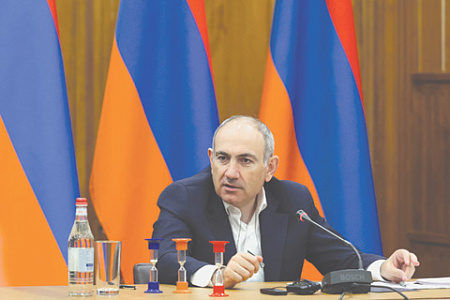
In the run-up to the summer holidays and the increasingly deteriorating global situation, many might not have noticed the interesting political developments in Georgia and Armenia. Behind the facade of talking about “fraternal ties,” most of the processes in these countries go completely unnoticed, since they are rarely associated with any general trends. However, the almost simultaneous critical statements of “pro–Western elites” against the Georgian Orthodox and Armenian Apostolic Churches is, if not a coordinated approach, then it certainly reflects the general attitude of local “Europeans” towards these respected institutions, which decided not to follow the ideological preferences of the former.
Since the beginning of June 2025, Armenian Prime Minister Nikol Pashinyan has initiated an unprecedented public campaign against the Armenian Apostolic Church. At a government meeting on May 29, he described a number of historic churches as cluttered “storerooms” filled with sacks of cement, buckets, and scrap metal. Soon after, Pashinyan and his wife Anna Hakobyan continued their criticism on social media. Pashinyan accused high-ranking representatives of the clergy, including Archbishop Hovhannes Hakobyan of the Gugar diocese, of violating their vow of celibacy and demanded that they be defrocked. He also publicly challenged Catholicos of All Armenians Garegin II, saying that if he really has a child, he should resign. In one of his publications, full of rude language, he insulted the bishop, causing public outrage. The Armenian Apostolic Church reacted immediately. The Supreme Spiritual Council described Pashinyan’s statements as “blasphemous,” “unworthy of a statesman,” and politically motivated, undermining national unity. Bishop Hovhannes Hakobyan called the prime minister “unstable,” and Archbishop Arshak Khachatryan called for mutual respect and condemnation of radical rhetoric.
There is an opinion that this conflict has its roots in the political events after 2020, when the church questioned the legitimacy of Pashinyan’s leadership. Today, the confrontation is deepening, turning into a struggle for the legal and moral status of the church. Some believe that state interference in the choice of the Catholicos has no constitutional basis and threatens to violate the traditional separation of church and state. The public’s reaction turned out to be polarized. Some citizens support Pashinyan’s desire to uncover abuses within the church, while others regard his campaign as irresponsible and disrespectful to an institution that enjoys high trust. According to polls, more than 70% of Armenian citizens trust the Armenian Apostolic Church, significantly more than any of the political leaders. In this context, criticism of Pashinyan can have negative social and political consequences.
Former Georgian President (2018-2024) Salome Zurabishvili also actively criticizes the Georgian Orthodox Church, especially in the context of recent political unrest and protests, positioned as “pro-European.” In her opinion, this criticism is based on the deepening contradiction between the secular, pro-Western strata of Georgian society and the traditionally influential church, which she accuses of supporting conservative and anti-European forces. Zurabishvili argues that the church has lost its status as a neutral moral authority, turning into a politicized structure opposed to the democratic aspirations of citizens. In her speeches and interviews, she accused the church hierarchy of supporting the ruling Georgian Dream party and discrediting protests aimed at Georgia’s integration into the Euro-Atlantic space. In her opinion, the Church provides an ideological cover for suppressing the opposition, propagandizing nationalist rhetoric and presenting Western liberalism as a threat to Georgian identity and Orthodox values.
Particularly disturbing, she said, is the church’s silence or indirect approval of violence against civil society and the opposition. She condemns the church’s inability to speak out against political violence and defend the right of citizens to peaceful protest, which, in her opinion, undermines the moral authority of the church and its traditional function as a unifying force in society. In addition, Zurabishvili warns that the church’s orientation towards anti-European narratives, often imposed from Russian Orthodox circles, further distances Georgia from its European course. By prioritizing church authority over democratic accountability, the church, in her opinion, promotes the legitimization of political resistance to reforms and European integration. Her statements represent a rare and bold challenge to the powerful institution of Georgian public life, reflecting the growing discontent on the part of liberal elites about the political bias and ideological regression of the church.
The bravery of Pashinyan and Zurabishvili is not an amateur act, but rather well-thought-out and conscious steps. It is no secret that Georgian and Armenian preachers of the Western course, as well as civil society, receive active political, logistical and financial support from the same American and European sources. The two groups are also actively cooperating, especially after the cooling of relations between Yerevan and Moscow and the beginning of the cold war between Tbilisi and Brussels. The West, which itself has gone through the confrontation of the secular population with the clerical one, is well aware that local churches are a very strong mechanism of influence. Therefore, for many years in Georgia, the pro-Western third president Mikhail Saakashvili tried first to belittle the role of the church in the life of Georgians, and then to make friends with this institution. The goal was to reformat local Orthodoxy in such a way that the church would become a continuation of the radically “pro-Western” political, business, and academic elites that had formed in the country.
It is obvious to both Pashinyan and Zurabishvili that the church will not disappear. Therefore, if it cannot be replaced with controlled structures, then the institute should be headed. Consequently, Zurabishvili is waiting for the departure of Catholicos Ilya II, but the Prime Minister of Armenia is preparing a commission to appoint his own protege. It turned out that the promises of Western benefits could not shake people’s faith in the church, which had gone through more difficult times than once.
